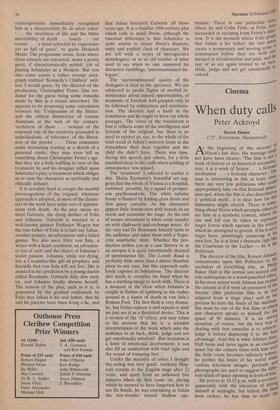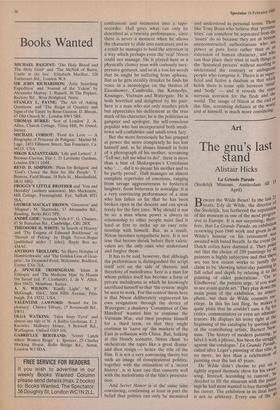Cinema
When duty calls
Peter Ackroyd
Secret Honor (`15', Everyman, Hampstead) the beginning of this account ,c 'd dNixon's last days, the message COl not have been clearer: 'The film is not a work of history or an historical reconstr; tion, it is a work of fiction . . . a fictional meditation . . . a fictional character'. The man is interesting in this at least, silleed, there are very few politicians who coo appropriately take on that fictional dimen- sion and, when the film is also described as a 'political myth', it is clear how far this dimension might stretch. There is some- thing about Nixon which prompts others! see him in a symbolic context, where °1s rise and fall can be taken to represent „, larger forces which operate in the society which he attempted to govern. If he is notn tragic hero, unwittingly conniving at his own fate, he is at least a dramatic type lik„e the Courtesan or the Lecher — he is th Politician. The director of the film, Robert Altman' concentrates upon this Politician to the exclusion of everything else, as Phth,P Baker Hall in the central and indeed only role soliloquises in a wood-panelled officeri In his most recent work Altman has treat; the cinema as if it were an extension of the theatre (this particular film is in fact adapted from a stage play) and in the process he tests the limits of the medill11: this must be one of the few films in will,'" one character speaks to himself for the space of 90 minutes. It is an unreal situation, of course, but the best waY ° dealing with that unreality is to acknow; ledge it before displaying it to the best advantage. And this is what Altman does; Hall turns and turns again in an enclose?, space but the camera turns with him until the little room becomes infinitely echoic; he probes the limits of his world whilAe various television images, portraits an photographs are used to suggest the diffe- rent kinds of space opening in front of Oh' He arrives at 10.13 p.m. with a revolver, apparently with the intention of 001 himself at midnight; but before the fatal . hour strikes, he has time to recite his confessions and memories into a tape- recorder. Hall gives what can only be described as a bravura performance, since there is never a moment when he allows the character to slide into caricature and as a result he manages to hold the attention in a way which perhaps even the 'real' Nixon could not manage. He is played here as a physically clumsy man with curiously inex- pressive gestures, and so at a loss for words that he might be suffering from aphasia. But as he gets steadily drunker he finds his voice in a monologue on the themes of Eisenhower, Cambodia, the Kennedys, Kissinger, Vietnam and Watergate. He is both horrified and delighted by his past: here is a man who not only touches pitch but appreciates his defilement as the true mark of his character; he is the politician as gangster and apologist, the self-conscious populist who has incorporated both small- town self-confidence and small-town fury.
But the more ferociously he has grasped at power the more completely he has lost himself and, as he abases himself in front of a photograph of his mother, screaming 'Tell me, tell me what to do!', there is more than a hint of Shakespeare's Coriolanus who . . did it to please his mother and to be partly proud'. Hall manages an almost complete repertoire of emotions, ranging from savage aggressiveness to hysterical laughter, from bitterness to nostalgia: it is a very convincing performance of a man who has fallen so far that he has been broken open in the descent and can speak freely for the first time. Why should it not be so: a man whose power is always in relationship to other people must find it hard at first to strike up an easy rela- tionship with himself. But, as a result, Nixon becomes sympathetic ,here. It is not true that heroes shrink before their valets: valets are the only ones who understand and forgive them.
It has to be said, however, that although the performance is distinguished the script itself errs on the side of rhetoric and therefore of melodrama: here is a man for whom politics itself has become a form of private melodrama in which he knowingly sacrificed himself so that 'the system' might be seen to work. For the central thesis here is that Nixon deliberately engineered his own resignation through the device of Watergate: a shadowy 'Committee of One Hundred' wanted him to continue the Vietnam War, and then propose himself for a third term, so that they might continue to 'carve up' the markets of the East in collusion with China. But, balking at this bloody scenario, Nixon chose `to orchestrate the tapes like a great drama' and then resign — hence the title of the film. It is not a very convincing theory but such an image of conspiratorial politics, together with the intimation of a 'secret history', is at least one that consorts well with the melodrama of the film's presenta- tion.
And Secret Honor is at the same time convincing, confirming at least in part the belief that politics can only be measured and understood in personal terms. Those like Tony Benn who believe that 'persona• lities' can somehow be separated from the `issues' do so because they are at bottom unreconstructed authoritarians who see power as pure force rather than as an extension of human character, and 4° can thus place their trust in such things as the 'historical process' without needing te understand the contrary or ambiguous people who comprise it. Theirs is as super' ficial and fictive a dualism as that which, holds there is some split between Wild and 'body' — and it reveals the same nervous aversion for the flesh and the world. The image of Nixon at the end of I this film, screaming defiance at the world and at himself, is much more convincing.















































 Previous page
Previous page